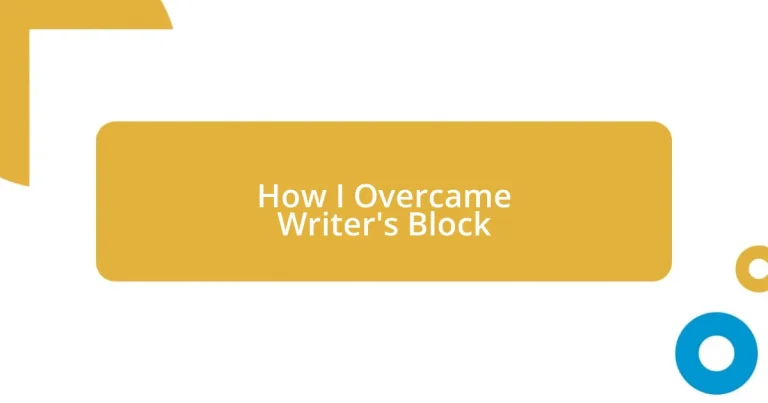Key takeaways:
- Understanding the root causes of writer’s block, such as fear and perfectionism, is essential for overcoming it.
- Establishing a consistent writing routine and recognizing personal triggers can enhance creativity and productivity.
- Engaging in creative exercises and seeking feedback from others can provide fresh perspectives and inspire new ideas.
- Celebrating small victories in the writing process can boost motivation and reinforce progress.

Understanding Writer’s Block
Writer’s block can feel like an impenetrable wall, one that stands between you and your creative flow. I remember sitting in front of my blank screen, heart racing and thoughts swirling. It’s an isolating experience, isn’t it? You might wonder, “Why can’t I just write?” The truth is, this struggle can stem from fear of failure, self-doubt, or even perfectionism.
In my experience, understanding the root causes of writer’s block is essential. For me, it often surfaced when I was trying to write about something I wasn’t passionate about. I’d think, “What if this isn’t good enough?” That pressure only heightens the sense of stagnation. Recognizing that our mindset plays a huge role in creativity can be a turning point.
I’ve also learned that writer’s block doesn’t just happen to beginners. It’s something seasoned writers face too. I once spoke with a published author who shared that even after years of experience, the fear of criticism could paralyze them. How about you? Have you ever felt that inner critic stifling your creativity? Acknowledging that you’re not alone in this battle can be a powerful first step toward overcoming it.

Identifying Personal Triggers
Identifying personal triggers is crucial in overcoming writer’s block. I recall a time when I’d freeze at my desk every time I attempted to write during early mornings. That urgency to produce immediately clashed with my natural rhythm. Pinpointing this made a significant difference; I started setting aside time in the afternoon instead, when my thoughts felt clearer and more fluid.
It’s also important to acknowledge external factors that can trigger these blocks. For instance, I found that working in a cluttered environment left me feeling anxious and unfocused. Once I created a more organized and inspiring space, my creativity flowed much better. Did you know that even small changes, like adjusting your lighting or choosing soothing background music, can alter your mindset? It’s these little details that can help us tap into our creativity more effectively.
Understanding emotional triggers is another aspect that I believe deserves attention. There was a period when I realized that writing about personal experiences often brought up uncomfortable feelings, causing me to shut down. By recognizing this pattern, I began to approach such topics with gentler self-compassion. This reduction in self-criticism created a safe space for my thoughts to emerge, reminding me of the importance of tuning into my emotions while writing.
| Type of Trigger | Personal Experience |
|---|---|
| Time of Day | Afternoons work better for my creativity compared to early mornings. |
| Environment | A cluttered workspace made me anxious. An organized space improves my focus. |
| Emotional Response | I felt blocked when addressing uncomfortable topics, but self-compassion opened new pathways. |

Establishing a Routine
Establishing a routine was a game changer for me in overcoming writer’s block. Initially, I would sit down to write whenever I had a moment, which often led to frustration. By creating a structured writing schedule, I found that my brain adapted better to knowing when to expect creativity. I remember those early morning hours when I’d brew a cup of coffee, sit at my desk, and feel the familiar calm wash over me as I settled into a writing rhythm.
Developing a routine doesn’t have to be rigid; it just needs to create consistency that suits you. Here are some elements you might consider incorporating into your routine:
- Set Specific Writing Times: Choose times of day when you’re most inspired and stick to them.
- Create a Comfortable Workspace: Ensure your writing environment is tidy and free of distractions.
- Incorporate Breaks: Step away periodically to refresh your mind—this can spark new ideas.
- Start with Free Writing: Allow yourself a few minutes to jot down whatever comes to mind; it can loosen you up.
- Set Goals: Whether it’s word count or time spent writing, having achievable goals keeps motivation high.
I can’t stress enough how liberating it feels to write within a framework that works for you. After establishing my routine, I started producing work that resonated more, and most importantly, I enjoyed the process again.

Utilizing Creative Exercises
Creative exercises can be a powerful remedy for writer’s block, offering a refreshing shift in perspective. I remember one instance when I felt particularly stuck, so I decided to try a free writing session. For ten minutes, I let my pen flow without judgment, scribbling whatever popped into my head. Surprisingly, the act of unfiltered writing not only broke the tension but also led me to uncover ideas I hadn’t even realized were brewing within me.
Another approach that really worked was indulging in visual art. One rainy afternoon, I found myself doodling mindlessly while listening to music. It felt liberating to express creativity in a different medium. Have you ever tried painting or even coloring? Engaging in these activities can ignite new thoughts and inspire fresh storylines. They remind me that creativity isn’t confined to writing alone; it’s all about playfulness.
Finally, I found that incorporating prompts from various sources reignited my inspiration. For example, asking myself “what if?” questions about a character’s journey has invigorated my writing process. I often ask, “What if my protagonist faced a completely unanticipated challenge?” Those simple prompts can launch me into a whirlpool of new ideas. So, I encourage you to explore different creative exercises that resonate with you; you might be surprised where they lead!

Setting Realistic Goals
Setting realistic goals is crucial for maintaining momentum in writing. When I first started, I tended to aim too high, like writing a full chapter in one sitting. This often led to disappointment when I fell short. Over time, I learned to set smaller, more manageable goals, like writing just 300 words a day. This shift in my mindset allowed me to celebrate small victories, turning what once felt like a mountain into a series of achievable foothills.
I remember a particular week when I decided to break my writing tasks into daily snippets. Instead of focusing on the final product, I aimed for consistency: a short scene here, a character sketch there. I can still recall the sense of accomplishment I felt each evening, knowing I had met my small goal. It’s amazing how those tiny increments can add up. Have you tried this approach? You might be surprised at how much progress you can make without the stress of overwhelming targets.
Even now, I often reflect on how effective it is to set goals based not just on quantity, but quality too. Focusing on completing a draft, no matter the word count, rather than perfecting every line has been transformative. This balance gives my writing purpose while also alleviating the pressure I used to feel. Allowing room for imperfection opens doors to creativity, making the writing process not just productive, but enjoyable. What kind of goals resonate with you?

Seeking Support and Feedback
Reaching out for support and feedback can truly turn the tide when you’re up against writer’s block. I vividly recall a time when I shared a particularly challenging draft with a close friend who also happens to be a writer. Their thoughtful feedback revealed blind spots I hadn’t noticed and encouraged me to explore new angles in my story. Have you ever sought a fresh perspective? It can be both nerve-wracking and liberating!
Engaging in writer’s groups or online forums can also provide invaluable insights. I joined a local writers’ circle, and the camaraderie was unlike anything I’d experienced. Each session felt like a safe space where we could share our struggles and successes without judgment. The diversity of ideas in the group pushed me to think differently and sparked conversations that inspired new narratives. It’s amazing how connection can foster creativity, isn’t it?
Lastly, I’ve learned to value the opinions of beta readers. After finishing a project, I provide a few select individuals with my work and ask for honest feedback. Their reactions can be so enlightening. I still remember a reader pointing out a minor character’s development that I hadn’t fully explored. That simple comment reshaped my entire perspective on the plot. It’s a gentle reminder that sometimes, we’re too close to our work to see it clearly. Are you open to the constructive criticism of others? It might just be the key to unlocking your next breakthrough.

Celebrating Small Victories
Celebrating small victories has been a game-changer for me. I remember the first time I completed a paragraph I was really proud of—it felt like winning a mini-lottery! Each word that flowed out felt like a small triumph, and I started patting myself on the back for even the tiniest achievements. Have you ever paused to appreciate the small wins in your writing journey? You might be surprised at how empowering it can be.
One strategy I’ve adopted is treating each completed sentence as a reason to celebrate. I’ve found that even acknowledging small milestones, like finishing a brainstorming session or crafting a solid opening line, lifts my spirits. It’s almost like I’m building a little tower of success, brick by brick. Each small victory fuels my motivation and pushes me forward, reminding me that progress is progress, no matter how small it seems. Do you ever give yourself the credit you deserve for such moments?
I also keep a journal dedicated to my writing victories, no matter how minor. Looking back through it, I can see this tapestry of persistence—a reminder of all those times I fought through doubt. Writing down these small accomplishments reinforces my growth and progress in a tangible way. It’s fascinating how much joy can come from simply acknowledging where I’ve been. What if you tried capturing your victories in a similar way? You might discover a newfound appreciation for your journey, fueling your creativity and resolve.














